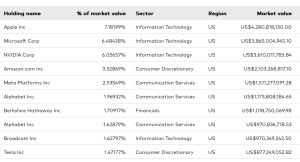ASML (NASDAQ:ASML) shares fell on 17 July after the Dutch company, which is also listed in the US, released its Q2 earnings before the European market opened.
While there were some strong Q2 results, the company, which makes lithography machines, downgraded some of its forecasts for the third quarter.
Let’s take a closer look at the stock, the market movement, and whether this could be an opportunity for UK investors.
ASML beats expectations, but guidance hurts
ASML reported strong Q2 2024 results, with total net sales of €6.2bn, a net income of €1.6bn, and a gross margin of 51.5%.
These figures largely surpassed market expectations due to higher sales of immersion systems. However, sales were down year on year with the company pointing to cyclical movements within the market.
Looking ahead, ASML projects Q3 net sales between €6.7bn and €7.3bn, with a gross margin of 50-51%. While its FY2024 outlook remains constant, there were some downgrades to the Q3 forecast.
ASML President and Chief Executive Christophe Fouquet reiterated his earlier commentary that 2024 is something of a transition year for the company.
Fouquet says that ASML sees strong developments in artificial intelligence (AI), which will drive demand for its technology moving forward.
This makes up for a weaker couple of years for the lithography segment with the world moving into a semiconductor glut across 2022-2024.
What does ASML do?
ASML’s a leading provider of photolithography machines, specialising in advanced extreme ultraviolet (EUV) lithography systems. These machines are crucial for semiconductor manufacturing, enabling the production of smaller, more powerful chips, and positioning ASML as a key player in the global semiconductor industry.
It has a stunning 82.9% share of the market and a monopoly on the most advanced EUV systems. As such, it’s one of the most important players serving the booming AI and data centre market. That’s because chipmakers such as TSMC need lithography machines to build Nvidia and AMD‘s chipsets.
Geopolitics is always an issue
ASML’s position in the global semiconductor supply chain has made it a focal point in geopolitical tensions, particularly between the US and China.
According to recent reports, the US is considering implementing the foreign direct product rule (FDPR), which would allow it to impose controls on foreign-made products incorporating even minimal amounts of American technology.
This move aims to leverage trade rules with allies and curb China’s access to advanced semiconductor technology and would impact ASML and its peers.
China, which accounted for 29% of ASML’s net sales in 2023, is a significant market for the company, second only to Taiwan.
However, more prohibitions on ASML’s exports could really hurt its prospects.
Should we consider it?
ASML’s a great company, with strong margins and a monopoly in one of the most important sectors globally.
While it’s not cheap at 51.3 times forward earnings and with a price-to-earnings-to-growth ratio of 2.25, it’s hard to find a more dominant company in any part of the tech sector.
It’s certainly a stock that’s on my radar, and the appreciation of the pound — £1 to $1.30 at the time of writing — does make the US-listed shares cheaper.
While individual investors have to make the decisions that are right for them, I think ASML is worth considering as a company with a deep moat and strong growth potential.
This post was originally published on Motley Fool







